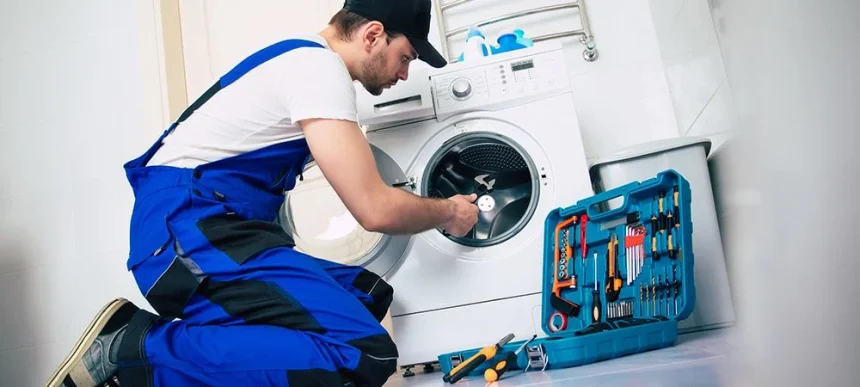Appliances play a crucial role in our daily lives, from keeping our food fresh to ensuring our clothes are clean. However, when appliances malfunction, it can disrupt your routine and potentially cause significant inconvenience. Identifying common appliance issues early can save you time and money on repairs. For residents in Burlington, recognizing the signs of malfunction can lead to timely interventions and prevent more severe problems.
In this guide, we’ll explore how to identify common appliance issues and what steps you can take to address them. For reliable and expert assistance, consider Burlington Appliance Repair to handle any appliance concerns.
1. Unusual Noises
Identifying the Issue
Unusual noises from appliances can indicate various issues. For example, a grinding noise from a dishwasher could mean that a foreign object is stuck in the spray arm, while a clunking sound from a washing machine might suggest a worn-out drum bearing. Pay attention to any abnormal sounds and consult your appliance’s manual to diagnose the problem.
Possible Causes
- Dishwasher: Foreign objects in the spray arm or a damaged motor.
- Washing Machine: Worn drum bearings or loose parts.
- Refrigerator: Faulty condenser fan or compressor issues.
2. Inconsistent Temperature
Identifying the Issue
Inconsistent temperature in appliances like refrigerators or ovens can lead to food spoilage or improper cooking. If your refrigerator is too warm or too cold, it might be due to a malfunctioning thermostat or poor air circulation. For ovens, uneven baking might be caused by faulty heating elements or inaccurate temperature sensors.
Possible Causes
- Refrigerator: Faulty thermostat or evaporator fan problems.
- Oven: Broken heating elements or a malfunctioning temperature sensor.
3. Poor Performance
Identifying the Issue
When appliances like washing machines or dishwashers show poor performance, such as not cleaning effectively or failing to spin properly, it could be due to several factors. A washing machine that doesn’t spin might have a broken drive belt, while a dishwasher that doesn’t clean well could be suffering from clogged spray nozzles or a failing pump.
Possible Causes
- Washing Machine: Broken drive belt or clogged drain pump.
- Dishwasher: Clogged spray nozzles or malfunctioning pump.
4. Frequent Cycling
Identifying the Issue
Frequent cycling of appliances, such as refrigerators or air conditioners, can be a sign of trouble. If your refrigerator turns on and off frequently, it might be due to a faulty thermostat or an issue with the compressor. Air conditioners that cycle too often could have issues with their thermostat or refrigerant levels.
Possible Causes
- Refrigerator: Faulty thermostat or compressor issues.
- Air Conditioner: Thermostat problems or low refrigerant levels.
5. Leaks and Water Damage
Identifying the Issue
Leaks from appliances such as washing machines, dishwashers, or refrigerators can cause water damage and mold growth. Inspect your appliances for any signs of leaks or pooling water. A washing machine with a leaking hose or a dishwasher with a faulty seal can lead to significant water damage if not addressed promptly.
Possible Causes
- Washing Machine: Leaking hose or faulty water pump.
- Dishwasher: Damaged door seal or broken water inlet valve.
6. Electrical Issues
Identifying the Issue
Electrical problems in appliances can manifest as flickering lights, malfunctioning controls, or even complete power loss. Check if the appliance is properly plugged in and if the circuit breaker has tripped. Persistent electrical issues may indicate a deeper problem with the appliance’s wiring or internal components.
Possible Causes
- General Electrical Issues: Faulty wiring or tripped circuit breakers.
- Specific Appliances: Malfunctioning control boards or power switches.
7. Error Codes
Identifying the Issue
Many modern appliances display error codes when something goes wrong. Consult the appliance’s user manual to interpret these codes. Error codes can provide specific information about the problem, such as a malfunctioning component or a need for maintenance.
Possible Causes
- Various Appliances: Faulty sensors, blocked vents, or other component failures.
8. Water Not Draining
Identifying the Issue
Appliances like dishwashers and washing machines that do not drain properly can lead to standing water and potential damage. Check for blockages in the drain hoses or filters, and ensure the drain pump is functioning correctly. Persistent drainage issues may require professional assistance.
Possible Causes
- Dishwasher: Clogged drain hose or faulty drain pump.
- Washing Machine: Blocked drain filter or malfunctioning drain pump.
9. Appliance Not Starting
Identifying the Issue
If an appliance fails to start, it might be due to a variety of issues, such as power supply problems, faulty switches, or broken components. Ensure that the appliance is plugged in and check the power source. If the appliance still does not start, professional diagnosis may be required.
Possible Causes
- General Issues: Faulty power switch or electrical supply problems.
- Specific Appliances: Broken motors or control boards.
10. Excessive Vibration
Identifying the Issue
Excessive vibration in appliances like washing machines or dryers can indicate imbalance or mechanical issues. Check if the appliance is level and ensure that the load is evenly distributed. If vibration persists, there might be internal issues that need addressing.
Possible Causes
- Washing Machine: Unbalanced load or worn-out shock absorbers.
- Dryer: Worn drum rollers or an imbalanced drum.
11. Strange Smells
Identifying the Issue
Strange smells from appliances can signal problems like overheating or burning components. If you notice a burnt smell or unusual odors, it’s essential to investigate the source immediately. This can help prevent further damage or potential hazards.
Possible Causes
- Various Appliances: Overheating components or electrical issues.
12. Appliance Not Operating at All
Identifying the Issue
When an appliance stops operating altogether, it could be due to power issues, internal component failures, or other malfunctions. Verify that the appliance is properly connected to a power source and check for any visible signs of damage.
Possible Causes
- General Issues: Power supply problems or internal component failures.
13. Condensation and Frost Build-Up
Identifying the Issue
Excessive condensation or frost build-up in appliances like refrigerators or freezers can indicate problems with temperature regulation or air circulation. Check the appliance’s vents and seals to ensure they are functioning correctly.
Possible Causes
- Refrigerator: Faulty defrost system or blocked vents.
- Freezer: Poor door seal or malfunctioning thermostat.
FAQs
How can I diagnose common appliance issues on my own?
Start by observing the appliance for unusual noises, performance issues, or error codes. Consult the user manual for troubleshooting tips and check for common problems like clogged filters or loose connections. For more complex issues, consider seeking professional help.
When should I call a professional for appliance repair?
Call a professional if you encounter persistent issues, such as frequent breakdowns, electrical problems, or severe leaks. For expert diagnosis and repairs, Burlington Appliance Repair can provide reliable solutions.
What are the signs that an appliance needs immediate repair?
Immediate repair is needed if you notice signs like unusual noises, burning smells, water leaks, or if the appliance fails to start. Addressing these issues promptly can prevent further damage and potential safety hazards.
How can regular maintenance help in identifying appliance issues early?
Regular maintenance helps in identifying potential problems before they become major issues. Routine checks, cleaning, and inspections can uncover early signs of wear and tear, allowing for timely repairs and extending the appliance’s lifespan.
Conclusion
Identifying common appliance issues early can save you from costly repairs and ensure your appliances continue to function efficiently. By recognizing signs such as unusual noises, poor performance, and leaks, you can address problems promptly and seek professional help when needed. For reliable assistance with appliance repairs in Burlington, Burlington Appliance Repair offers expert services to resolve any issues you encounter. Taking proactive steps in appliance maintenance and repair will help you enjoy the convenience and efficiency of your appliances for years to come.
Read More From Techbullion And Businesnewswire.com








